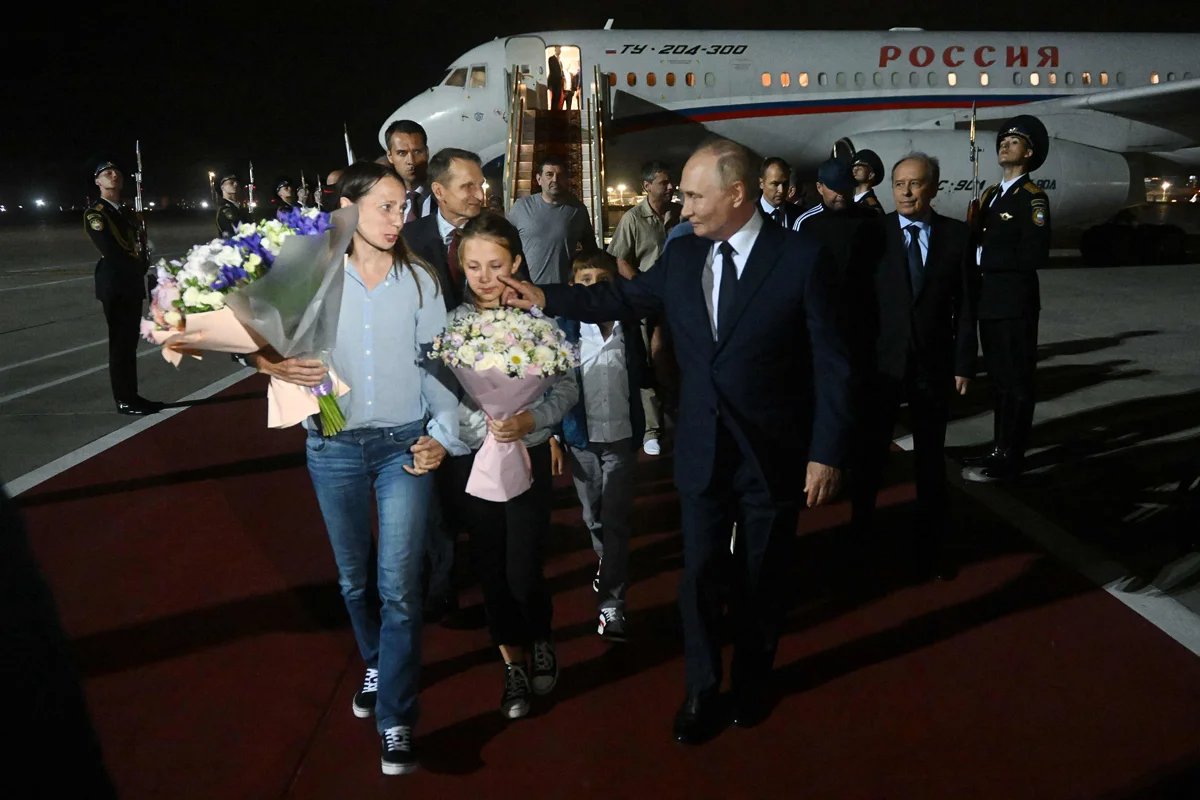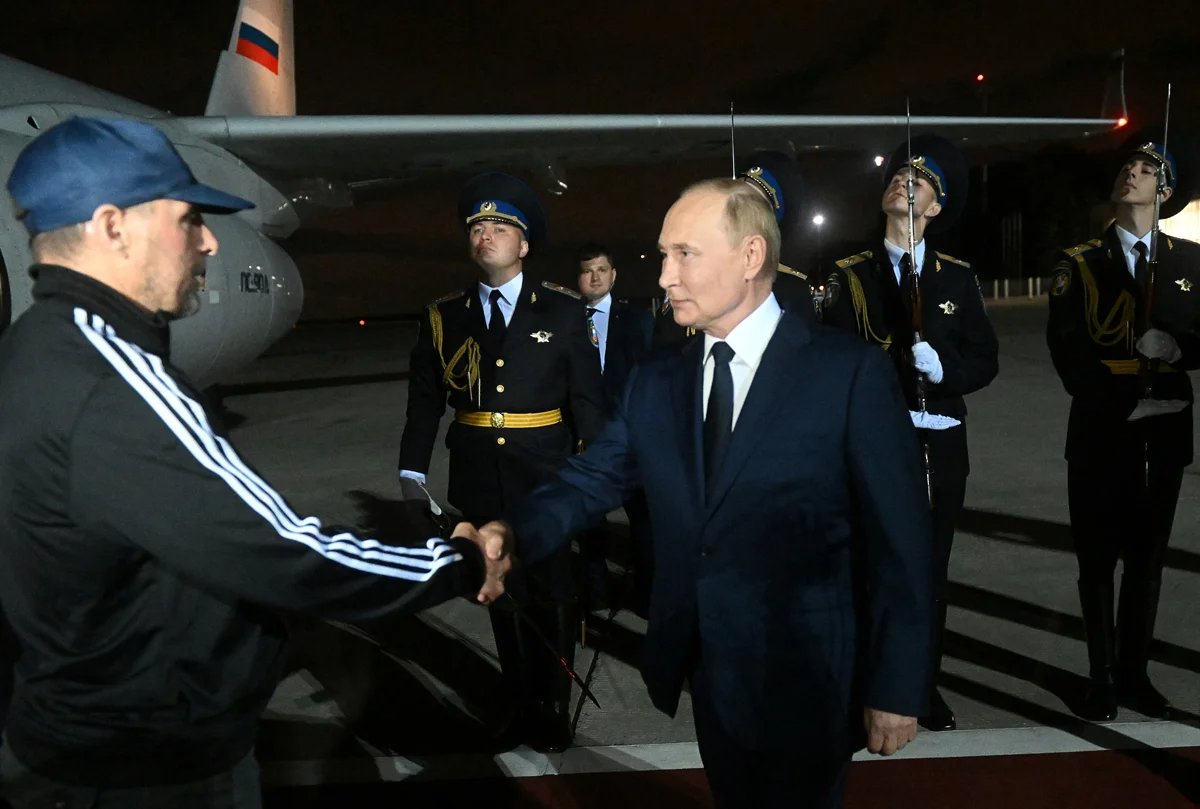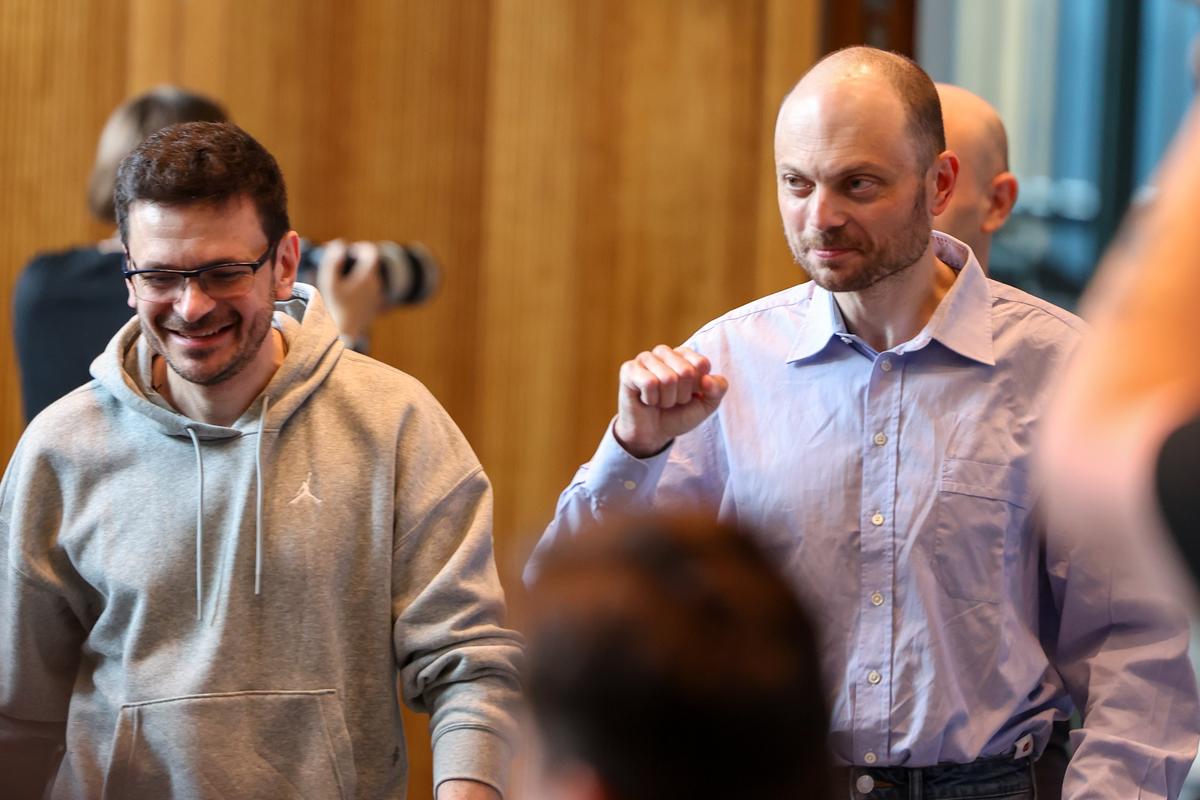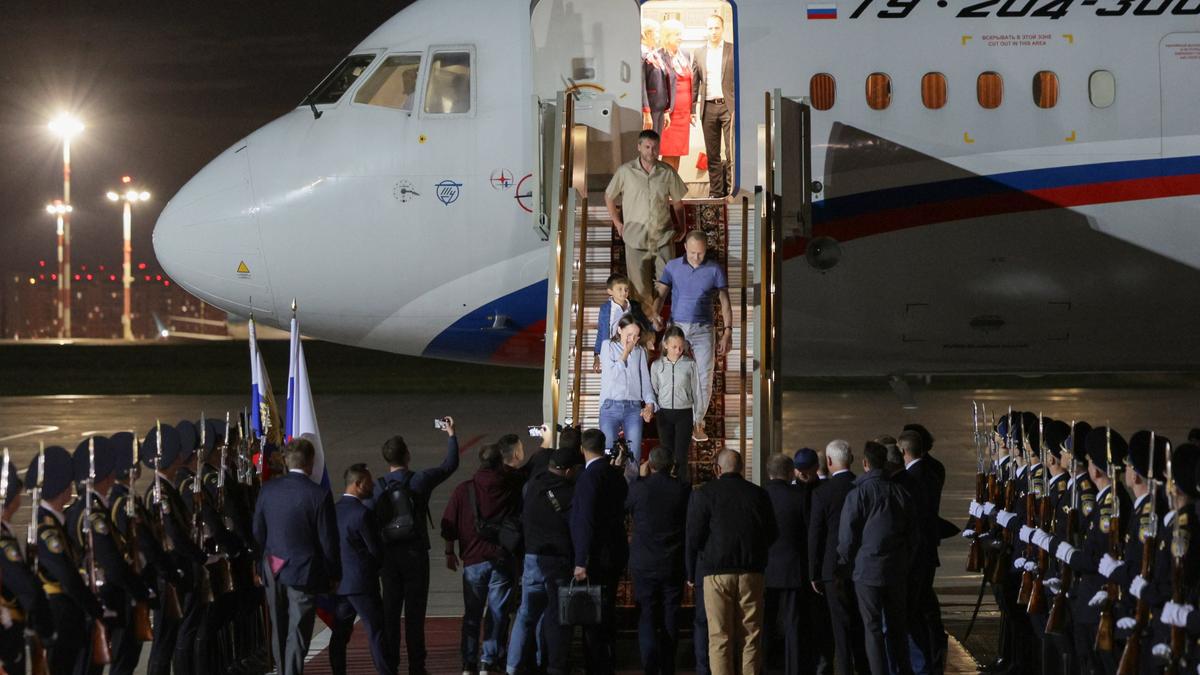After reports began to emerge early this week of growing numbers of Russia’s highest-profile political prisoners disappearing from the penal colonies where they were being held across the country, days of mounting speculation about an imminent exchange culminated on Thursday in the largest prisoner swap between Russia and the West since the Cold War.
A total of 24 former prisoners were exchanged in a meticulously planned operation at Ankara Airport in Turkey on Thursday afternoon. In one direction went 16 citizens of Russia, the US and Germany who had all been imprisoned by the Russian authorities for assorted “crimes”, most of which involved condemning the country’s invasion of Ukraine or daring to voice opposition to Vladimir Putin.
In the other went a motley crew of eight Russian citizens released from jails in five Western countries, including Vadim Krasikov, an FSB hitman sentenced to life imprisonment in Germany for the broad-daylight murder of a Chechen dissident in Berlin, and Artyom and Anna Dultsev, a pair of deep-cover agents who were exposed to be living in Slovenia, and whose children only learned they were Russian on their flight to Moscow.
Yet with over 1,200 political prisoners still behind bars in Russia, might Vladimir Putin not be seen to have “won” the exchange, having blackmailed Western governments into returning known criminals by arbitrarily locking up foreign citizens to use as bargaining chips in precisely such exchanges?
Novaya Europe asked Russian political analysts who ultimately gained the most from this week’s exchange, what Putin thinks of it all, and whether the historic swap is likely to set a precedent for future exchanges.
Did Putin win?
On a purely human level, the exchange has to be seen as a success, says political scientist Ivan Preobrazhensky. It almost certainly saved the lives of several of those imprisoned by the Russian government, with co-chair of Memorial Oleg Orlov and opposition politician Vladimir Kara-Murza at particular risk due to their respective health issues, and which were aggravated by their incarceration, he says. Indeed, Kara-Murza himself told US President Joe Biden in a phone call after his release on Thursday that he thought he would “die in jail”.
But Vladimir Putin and his inner circle also see the exchange as a success from their side, says Preobrazhensky. “Even though they killed Alexey Navalny instead of releasing him, they still managed to exchange random hostages for agents important to them and get Vadim Krasikov.”
The Kremlin would also be hoping that “the freed politicians start competing with those who campaigned for their release, sowing discord within the opposition”, Preobrazhensky continued.
“Of course, Putin considers himself the winner — if he didn’t, he wouldn’t have come to the airport to meet his freed agents. He only ever appears when he tastes victory.”
Yet to see the “terrorist” Putin as the winner of the exchange is to adhere to his “cannibalistic” logic, which ignores the value of human life, Preobrazhensky says, pointing to the fact that Western democracies secured the release not just of their own citizens, but also of Russian political prisoners.
“Should the hostages be released? Yes, absolutely. The other question is: what do we do next? We need to try to destroy the terrorists. But when the terrorist is a huge country with nuclear weapons, that’s very difficult”, he concluded.
Analyst Stanislav Belkovsky agreed that the release of so many political prisoners from Russian jails was a triumph for the country’s opposition, regardless of how Putin sees things.

Vladimir Putin welcomes freed Russian agent Anna Dultseva and her family to Moscow’s Vnukovo Airport, 1 August, 2024. Photo: Mikhail Voskresensky / Sputnik / AFP / Scanpix / LETA
“Of course, Putin considers himself the winner — if he didn’t, he wouldn’t have come to the airport to meet his freed agents. He only ever appears when he tastes victory. But this is not a defeat for the opposition. People have gone free, which is very important”, Belkovsky stressed.
While Russian political journalist Fyodor Krasheninnikov also said he saw the exchange as a success for the Russian opposition, he and Belkovsky both agreed that the release of convicted assassin Vadim Krasikov from prison in Germany set a dangerous precedent.
“If Krasikov hadn’t been released, the political prisoners would have been kept in jail. Germany really did make concessions to Putin and let him win this round. Now all Putin’s spies and assassins have a wonderful motivation — they will all be convinced that they’ll be rescued. What can we do about that? We don’t have the option of standing proudly and saying we won’t enter into negotiations knowing that our allies are being left to waste away in prison”, Krasheninnikov said.

Vladimir Putin shakes the hand of exchanged assassin Vadim Krasikov at Moscow’s Vnukovo Airport, 1 August 2024. Photo: Mikhail Voskresensky / Sputnik / Reuters / Scanpix / LETA
Will the swap benefit Russia’s exiled opposition?
According to Preobrazhensky, the exchange has created an entirely new class of Russian opposition leaders: those who have served time behind bars for their beliefs and will therefore be able to communicate with Russians inside the country much more effectively — something that could significantly strengthen the opposition movement as a whole.
While Kara-Murza was already known to Western politicians for his key role in lobbying for sanctions against Putin and his inner circle, Preobrazhensky said that the time he spent in prison only served to further bolster his credibility and might afford him a platform from which to explain why some Western sanctions on Russia are either wrong or not working as well as they should, leading potentially to significant policy changes.
Others released in the exchange, such as politician Ilya Yashin, meanwhile, may be well placed to appeal to Russians who don’t support Putin but who remain sceptical of opposition figures who have left the country, Preobrazhensky says.
Krasheninnikov agreed, saying he saw great potential for Yashin’s as someone who “escaped Putin’s clutches” and predicting that Yashin and Kara-Murza may change the balance of power within the Russian opposition.
Belkovsky, however, believes that while Russia’s anti-Putin opposition has been strengthened in a “moral and intellectual sense” following the release of so many of its key figures, the exchange will have little impact on its overall political influence.
“There is no practical scenario for the opposition to take power in Russia or even get close to it at the moment. This is a full-fledged totalitarian state where the transfer of power is not on the table”, he stressed.

Ilya Yashin and Vladimir Kara-Murza after their release in Germany. Photo: EPA-EFE / CHRISTOPHER NEUNDORF
Will more exchanges follow?
Only after a large-scale campaign to identify and imprison Russian agents abroad would there be the chance of any further exchanges, according to Preobrazhensky, as there is no longer anybody as important to Putin as Krasikov imprisoned outside Russia.
“This is essentially a one-way process. If you’re dealing with terrorists, you need to get the terrorists interested in exchanging hostages. There’s no way other than forceful pressure”, Preobrazhensky said. “The Russian government is behaving like terrorists. Until they want to change, there won’t be any new exchanges”.
Belkovsky agreed that further swaps may be possible in the future, but said the West needed to hurry to complete them before the US presidential election in November. He also said that much depends on the political will of Western countries, with governments only likely to be open to exchanges if their own citizens are involved.
“The Russian political prisoners wouldn’t have been released if American citizens hadn’t been exchanged, and that will continue to be the case. Russians will only be exchanged together with American or German citizens, otherwise the US and German authorities won’t show the necessary enthusiasm for this type of deal”, he concluded.
Join us in rebuilding Novaya Gazeta Europe
The Russian government has banned independent media. We were forced to leave our country in order to keep doing our job, telling our readers about what is going on Russia, Ukraine and Europe.
We will continue fighting against warfare and dictatorship. We believe that freedom of speech is the most efficient antidote against tyranny. Support us financially to help us fight for peace and freedom.
By clicking the Support button, you agree to the processing of your personal data.
To cancel a regular donation, please write to [email protected]

